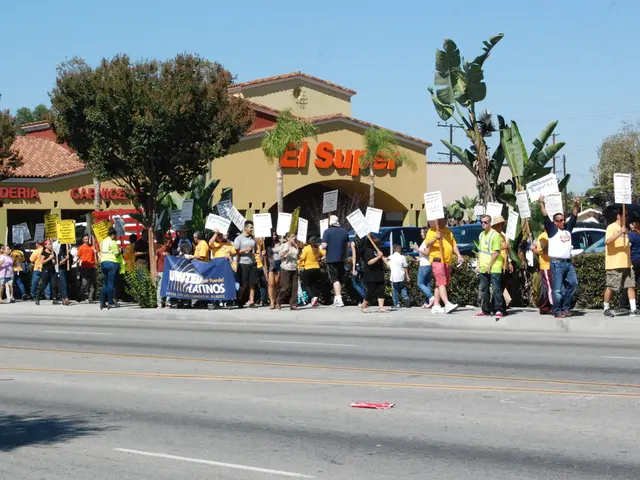Democracy faces risk from Christian nationalism, while secularism serves as its safeguard.
In recent times, there has been a growing discussion about a potential Christian revival in Britain, a trend that has raised eyebrows and sparked concern among many. This resurgence was on full display at the 'Unite the Kingdom' march in London, where Christian nationalism took centre stage.
Men dressed as crusaders, bible verses on banners, crosses held high, and open calls to "reclaim" Britain for Christianity were prominent features of the march. Notable participants included Tommy Robinson, who has increasingly invoked faith as a marker of British identity, and Danny Kruger, a vocal advocate for re-Christianising public life.
Kruger, who has defected from the Conservatives to Reform UK, is likely to push his party towards Christian nationalism. He presents a return to Christian identity as the cure for perceived social fragmentation, lost values, and weakening cohesion. Robinson, who claims to have found God during a weekly bible study while in prison, believes that everything in Britain has come from the Bible and that the country's decline is due to the loss of faith and identity.
However, this resurgence is not without its critics. The Bible Society's report claiming a significant rise in monthly church attendance in England and Wales, particularly among young people and young men, has been met with scepticism. Professor David Voas of UCL's Social Research Institute has criticised the report for flawed survey design, overenthusiastic self-reporting, or polling anomalies.
Moreover, the argument that Western liberal democracy is rooted in Christianity and that unless we "return to God," our freedoms will inevitably wither is gaining traction among conservatives. This argument, while popular, overlooks the roots of modern liberal democracy in the Enlightenment, a period when thinkers began to challenge the authority of both monarchs and priests.
The rise of anti-secular identity politics is both divisive and dangerous, threatening democracy by undermining secular principles that protect everyone's rights and freedoms equally. Brian Tamaki, leader of New Zealand's Destiny Church, made alarming rhetoric at an event, calling for a religious war and banning public expressions of other religions in Christian nations.
It's important to note that any political movement influenced by Kruger is likely to be hostile to secular principles. This hostility is a cause for concern, as secular principles have been instrumental in safeguarding individual rights and freedoms, and maintaining a diverse and inclusive society.
The influence of American Christian Right funding and influence is also starting to impact UK politics. Several Christian organisations in the UK have been politically influenced through financial support from the US Christian Right, notably evangelical and conservative groups that engage in political advocacy aligned with American Christian conservative agendas.
In conclusion, while the resurgence of Christian nationalism in Britain may be gaining traction, it is crucial to remember the dangers of undermining secular principles. These principles have been instrumental in shaping modern liberal democracy and in protecting the rights and freedoms of all citizens. As such, it is essential to approach this resurgence with caution and vigilance.
This article was republished with permission from the National Secular Society's website on September 17, 2025.
Read also:
- United States tariffs pose a threat to India, necessitating the recruitment of adept negotiators or strategists, similar to those who had influenced Trump's decisions.
- Weekly happenings in the German Federal Parliament (Bundestag)
- Southwest region's most popular posts, accompanied by an inquiry:
- Discussion between Putin and Trump in Alaska could potentially overshadow Ukraine's concerns








